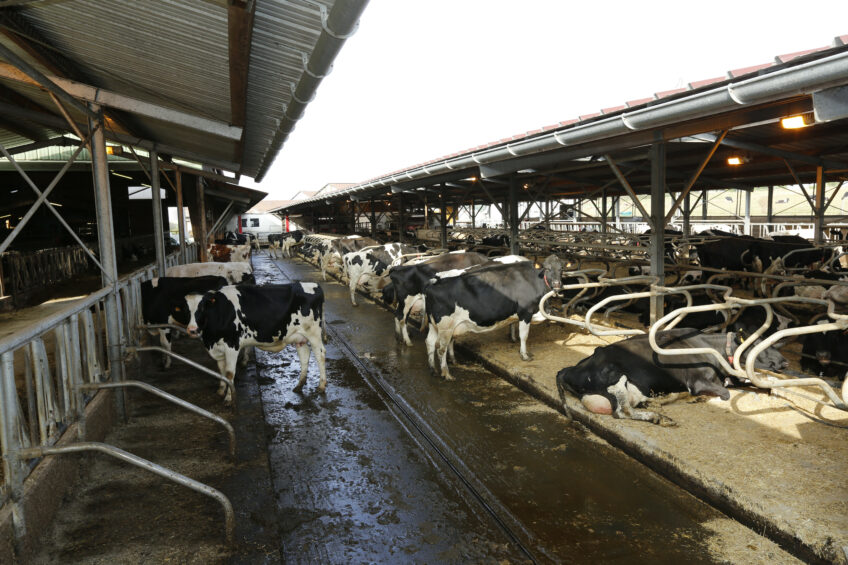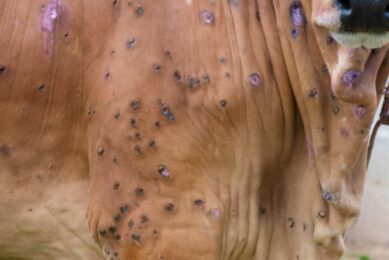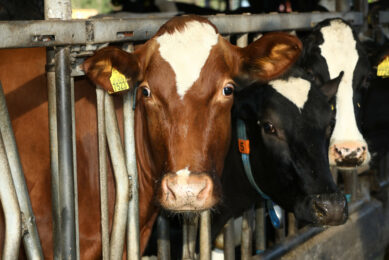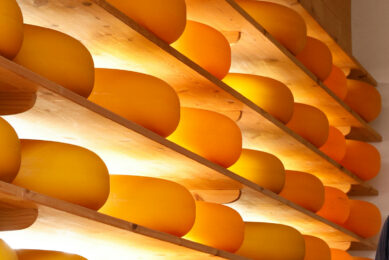Diversifying in an unstable milk market

At a farm in France, owned by eight entrepreneurs, the focus lies on increasing efficiency and on new activities. This makes the company as a whole less dependent on the fluctuating milk prices. Thibaut Cordel is one of the owners.
In the north of France, close to the border with Luxemburg and Germany, it sometimes seems as if time has stood still. Small herds of cattle and young stock are roaming outside in mid-October, amid the mobile feeding and drinking troughs. As in Luxemburg and the nearby German Saarland the landscape is hilly with endless wheat fields and vineyards along the Mosel.
Thibaut Cordel (29) one of the eight entrepreneurs of the Fermde d’Alliance company
Nevertheless, this region has a modern dairy farming sector with many large farms. The company Fermde d’Alliance of which the farm of Thibaut Cordel is one. It is even one of the largest dairy farms in this region. The company has a special history of origin. In the early 80’s, Cordel’s parents owned only 30 dairy cows and 70 acres of land. Their collaboration with family members and combining activities with other neighbouring farms led to the present structure. Eight local entrepreneurs are owners of the company with a total of 240 cows and 600 acres of land. In 1998 they jointly built a new barn, and expanded it in 2013. The new part is with an open construction and low roof, different from the enormous capacity of the original shed. In 2013, two milking robots were installed, which reduce labour in the traditional milking parlour.

Henk Riswick
Structure adapted
Cordel entered the partnership by purchasing and bringing in a nearby farm. Mostly due to his increasing commitment, the company structure and work method were examined and adjustments were made over the last few years. “A clear structure and efficient work methods are important in this company,” Cordel says.
In the new structure Cordel is in charge of the overall management of the farm and the others are responsible for a part of the company and work processes. Each Monday there is an operational working meeting, but there is also room for fundamental aspects about collaboration to discuss during these weekly meetings. An accountant and business consultant are brought in on a regular basis. When decisions are being made, half plus one of this voting group have to agree before something is implemented. In the case of big, fundamental choices, such as the recent investment in biogas production, all owners have to agree before a decision is made.
The professionalisation process Cordel initiated is also stated in the mission statement. The company wants to have its own identity, with basic rules on what is expected of the current and future partners. His greatest personal challenge is ‘people management’. “Including two employees and two interns, we have a staff of 10 to 12 people. We have made good arrangements but eventually, in a company structure like this, communication is key.” It is going well, Cordel notes, but he is fully aware of the importance of communication. He is regularly advised in this area.
Increase yield
Cordel is working towards three potential routes to increase the profitability of the total farm: more efficiency in dairy farming, higher yields of products and broadening of the activities. The company is open to new partners, but they will only be given a chance when they contribute to one of these routes. “An entrepreneur who has his own cheese factory would fit in nicely for example.”
Growth without added value is not an option. Legislation enables upscaling, but experience teaches us that in this part of France there is a lot of social resistance to farms with more than 200 cows. The dairy farmer also believes in diversity of the business. “As long as the branches are sizeable enough and are efficient.”
The focus is currently on increasing the efficiency of the dairy cows. Partly thanks to the new structure, the processes have been identified and improved when necessary. Pasture management remains a point of concern, as the farm owns more than 50 parcels of less than one acre. Also the rearing of the young stock leaves room for improvement. Some of the young stock are housed in old buildings, that need renovation in the short term. The rearing of the youngest calves has been spurred with new cubicles for the calves and more attention to feed and health.
It is mainly in meat where higher profits for products are achieved by the farmers. The company recently started using a farm shop near the city Metz, together with three other entrepreneurs. Every week two cows and two calves are slaughtered and the meat is sold in this shop. The dairy farmer estimates the extra profit to be €115 per calf and €1.50 per kilogramme of meat. This has whetted the appetite and there are ideas about producing and selling their own dairy products. “That would be a big step and involves some risks. This is why a milk processing farmer would fit well into our team.”

Henk Riswick
The biogas installation is a good example of a new business and a broadening of the activities. Before the end of 2016, the installation should run full speed. The installation with a capacity of 250 kW demanded an investment of €1.7 million. The farm will ferment all of its own manure, agricultural harvest waste and several cultivated crops. The investment can be financed thanks to a guaranteed price of 20.5 cents per kWh for the upcoming 15 years. Cordel expects the payback time to be less than a decade. “Economically it is an interesting investment, but it also fits in the company as a whole. We have the labour and the security of a continuous product flow to ferment.” Besides the typical domes of the digesters, the new (high) open shed is also an eye-catcher. The products for the digester will be deposited here, but the shed also serves as a feed centre for the dairy farm. “We will relocate the silage storage slabs so that feeding will be a lot more efficient and cheaper in the near future.”

Henk Riswick
Discontinue milking
Since Cordel’s addition to the company, the focus on cost and revenue has increased. In recent years, the company realised a cost price of €29 to €30 per 100 kilos milk. This includes financing and own labour. This resembles the critical milk price. Last year and this year the milk price was below this level; the lowest price was €24 and the last known milk price €26 per 100 kilo. Low prices are unpleasant, but the company will not go out of business because of it. “We take it into account in the financial planning. A couple more years of low prices will not be a problem, but after that it will start to hurt.” The company’s solid arable farming branch and continuing diversification makes it less dependent on the milk prices.
In the past year there have been regular discussions among the partners about whether or not to continue with cattle. To quit milking is a serious option when profitability remains low for too long. Cordel remains positive about the dairy sector. “I believe in economically responsible dairy farming in the long term, and thanks to our scale and organisation we are capable of working more efficiently than farms in our region. There will always be price fluctuations, but thanks to diversification of the company, we are less vulnerable.”
Biography
Company: Thibaut Cordel (29) owns a farm in the French Evendorff with approximately 230 dairy cows, 100 young stock (Limousine) and 600 acres of land, of which half is used for arable farming The annual production is 2.4 million kilo milk. The company is a partnership between eight local entrepreneurs who brought together six farms. The farm has three main locations for milking, rearing and beef cattle.
Join 13,000+ subscribers
Subscribe to our newsletter to stay updated about all the need-to-know content in the dairy sector, two times a week.










